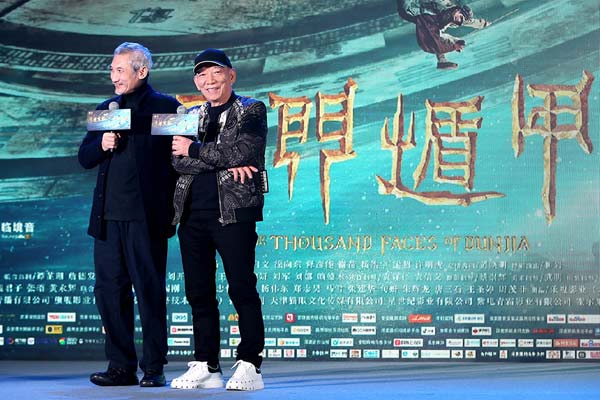 |
|
The two top names in Chinese martial arts films, Tsui Hark (left) and Yuen Woo-ping, promote their latest flick The Thousand Faces of Dunjia at a Beijing event. The film, however, has failed to meet many people's expectations. [Photo provided to China Daily] |
And the movie was successful in providing a showcase for the 67-year-old Tsui's and the 72-year-old Yuen's efforts in innovation.
"Monsters in Chinese movies are usually portrayed as demons that have transformed from animals or plants, but we wanted to connect them with myths about how the world began and how humankind first appeared on Earth," says Tsui during an interview with China Daily earlier this month.
Tsui also hopes the film will stand out to exemplify the diversity and profoundness of Chinese culture.
Critic-turned producer Wei Haijun explains more about the film he worked on for five years.
Chinese mythology, like the Yellow Emperor's epic battle against Chi You thousands of years ago, as well as Chinese astrology, were the main inspirations for the movie, says Wei.
After seeing martial arts films struggle in recent years, Wei decided that a Chinese-style superhero movie would appeal to younger audiences.
The movie is full of fantasy elements. The warrior played by Ni can transform into a piece of cloth to fly through a crowded market. A three-eyed fish demon morphs into part of a painter's scroll to hide from pursuers. A young woman who can turn into a giant bird has the power of resurrection.
Up to 1,000 scenes, or around two-thirds of the films' total content, are packed with digital special effects.
When cinematic efforts such as these fail to secure success, they also strike a sad note among the legions of Chinese mainland fans of Hong Kong's cinema, who were wowed by the work of these filmmakers in the 1980s.
"On the heels of John Woo and Andrew Lau, Tsui and Yuen have just become the latest members to join the surprising-flop club of the Hong Kong masters. What's wrong with them? It makes me miss the golden age of Hong Kong movies even more," says one critic on Douban.
Woo's long-anticipated Manhunt and Lau's The Founding of an Army, both released earlier this year, failed critically and commercially.